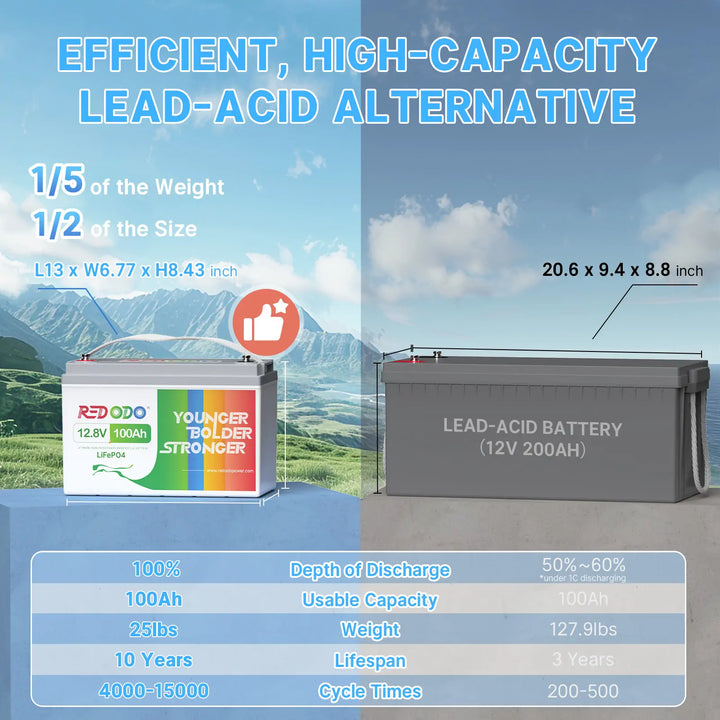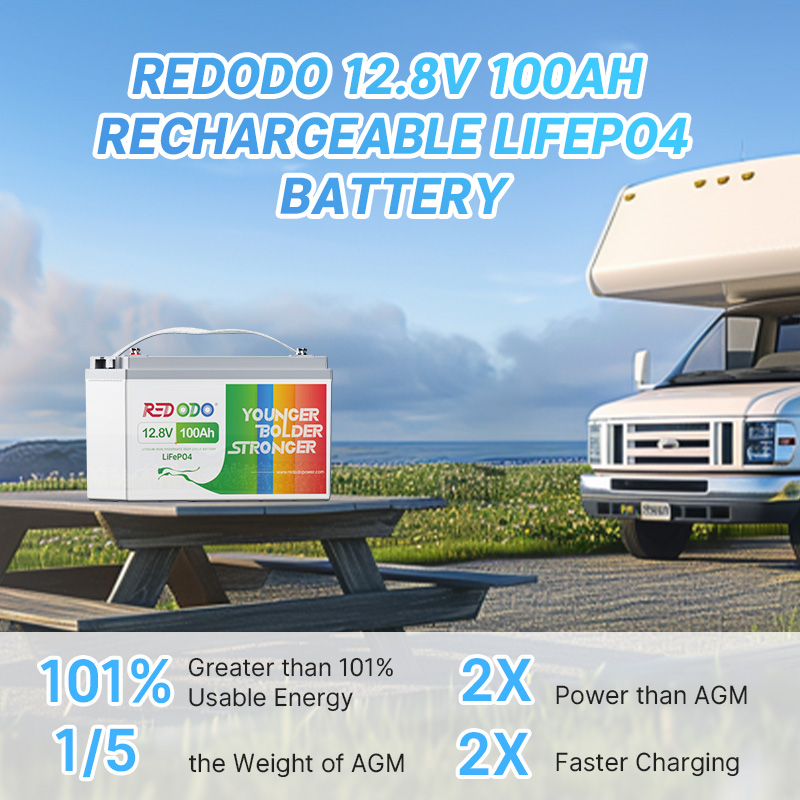When planning an exciting RV adventure, one of the most critical aspects to consider is your power supply. The number of batteries you need in your RV impacts your ability to enjoy a great trip. In this article, we’ll explore the questions that how many batteries do you need in your RVs, and how to calculate your power needs in your RV trip.
Table of Content
Key Factors Affecting Your Power Needs
Before determining how many batteries you need, it’s essential to assess your RV's power consumption. Your power needs will depend on several factors, including:
- Type of RV: Class A, B, or C RVs come with different power requirements.
- Appliances and Devices: Consider the number and type of electrical devices you will use, such as lights, devices, and entertainment systems. Pay special attention to energy-intensive devices like air conditioners, refrigerators, and heaters, as they significantly impact your power requirements.
- Usage Duration: How long you plan to stay off-grid or without plugging into shore power.
- Personal Comfort: Your preference for using electric appliances versus camping in a more rustic manner.
Additionally, here are some key considerations that affect the number of your RV batteries:
- Trip Duration: Consider the length of your camping trips and how often you’ll have opportunities to recharge. Longer trips with limited access to shore power may require more batteries to ensure an adequate power supply throughout your journey.
- Solar Panel Setup: If you plan to integrate solar panels with your RV lithium battery system, take into account the solar panel capacity and the average amount of sunlight you can expect during your travels. Solar panels can help recharge your lithium batteries during the day, reducing the number of batteries needed.
- Inverter Capacity: The size of your inverter also affects the number of lithium batteries required. An inverter converts DC power from the batteries into AC power for your appliances. Redodo offers a variety of inverters, from 300W to 3000W power.
Determining Your Battery Type: Lead-acid vs. Lithium
While traditional lead-acid batteries have been the standard for years, advancements in technology now allow RVers to upgrade to a lithium battery system.
The RV lithium battery system offers several advantages that make it a compelling choice for many RV enthusiasts.
Advantages of Upgrading RV Lithium Batteries
- Higher Energy Density: RV lithium batteries have a higher energy density than lead-acid batteries, allowing them to store more power in a smaller and lighter package. This is ideal for RVers looking to reduce weight and maximize space in their vehicles.
- Longer Lifespan: Lithium batteries typically last much longer than lead-acid batteries, making them a cost-effective long-term investment. A well-maintained lithium battery can last 10 years or more, whereas lead-acid batteries usually need replacement every 3-5 years.
- Faster Recharging Times: The high charge acceptance of RV lithium batteries enables faster recharging, minimizing downtime and providing more flexibility during your travels. With a lithium battery upgrade, you can recharge your batteries quickly and efficiently, even with limited time.
- High Discharge Rates: Lithium batteries can handle higher discharge rates compared to lead-acid batteries, making them suitable for power-hungry appliances and electronics in your RV.
Upgrade Redodo RV batteries to enjoy continuous power for your next RV trips now!
Related Reading: AGM vs. Lithium Batteries: Which is Better?
Calculating the Number of RV Batteries You Need
To estimate the number of batteries needed for your RV, follow these steps:
Step 1: Calculate Your Daily Energy Consumption
- List all the electrical devices you plan to use and note their wattage.
- Estimate the average number of hours each device will be used per day.
- Calculate the total daily energy consumption in watt-hours (Wh) by multiplying each device's wattage by the hours of use and summing the values.
Use the formula: Watt-Hours = Wattage × Hours Used
For example, if you have a 100W refrigerator running for 8 hours, the calculation would be: 100W × 8 hours = 800Wh
- Add the watt-hours for all appliances to find your total daily power consumption.
Step 2: Determine the Battery Capacity
Once you have your daily watt-hour consumption, you can determine how many batteries you'll need. Lithium batteries have more usable capacity since they can be discharged more deeply without damaging the cells. Let’s take lithium batteries as an example:
- Consider the usable capacity of the lithium batteries. Lithium batteries should not be discharged below a certain percentage of their capacity to ensure longevity (e.g., 80% depth of discharge).
- Divide your daily energy consumption by the usable capacity percentage to find the total battery capacity needed in watt-hours.
Step 3: Choose the Right Lithium Battery
- Select a suitable lithium battery model that meets or exceeds the total battery capacity calculated in the previous step. Consider factors like voltage, amp-hour rating, and overall performance.
For a 12V system, use the formula: Required Ah = Total Watt-Hours / 12V
For example, if your total daily power consumption is 2400Wh:
Required Ah = 2400Wh/12V = 200Ah
Step 4: Finalize the Number of Batteries
- Divide the total battery capacity needed by the capacity of the selected lithium battery model to find the number of batteries required.
As mentioned in the Step 3, your required Ah is 200Ah, that means you need a 12V 200Ah lithium battery or two 12V 100Ah lithium batteries for your RVs.
Conclusion
Determining how many batteries you need in your RV is essential for a successful and enjoyable camping experience. By assessing your power consumption, choosing the right type of battery, and calculating your capacity requirements, you can ensure that you have enough power to enjoy all the comforts of home while exploring the great outdoors.
Additionally, compared to lead-acid batteries, RV lithium batteries upgrade offer numerous advantages, including higher energy density, longer lifespan, faster recharging times, and better performance.
Explore our high-quality lithium RV batteries series and choose the best lithium battery for your RV, you’ll unlock the full potential of your RV and embark on memorable journeys with confidence and convenience!
FAQs on RV Camper Batteries
Do I Need a Deep Cycle Battery for My RV?
Yes, a deep cycle battery is essential for your RV. Unlike regular car batteries, which provide quick bursts of power, deep cycle batteries are designed to discharge slowly and provide sustained energy over a longer period. This is crucial for running appliances like refrigerators, lights, and water pumps while camping.
What size lithium battery should I get for my RV?
When considering a lithium battery for your RV, it's important to understand the group size, which indicates the physical dimensions and capacity of the battery. For example, a Group 24 lithium battery, which is popular option for RV applications due to its balance of capacity and space efficiency, also ideal for smaller RVs or those with minimal electrical demands.
However, if you require more power or longer usage times, you may want to consider larger group sizes, like Group 27 or Group 31 batteries, which offer higher capacities and longer runtimes. Always ensure that the battery fits your RV's battery compartment and meets your power requirements.
How many batteries do I need to run an RV refrigerator?
To determine how many batteries you need to run an RV refrigerator, first check the refrigerator's wattage, which typically ranges from 40 to 60 watts per hour. Multiply the wattage by the number of hours you plan to run the refrigerator each day. For example, if your refrigerator uses 50 watts and runs for 24 hours, that totals 1,200Wh (50W × 24h). A 12V 100Ah lithium battery provides about 1,200Wh of usable energy. Therefore, you would need one battery to run your RV refrigerator for a full day.

Redodo

Redodo
Recent Post

How Long Does a Trolling Motor Battery Last?

Convert RV from Lead-Acid to Lithium Battery: A Complete Guide

How Long Will a 200Ah Battery Run an Air Conditioner?

A Full Review of Redodo 12V 140Ah Group 31 Deep Cycle Battery





![⚡[$220 after Sign-Up] Redodo 12V 100Ah Group 24 Deep Cycle LiFePO4 Lithium Battery | For Home, RV, Marine](http://www.redodopower.com/cdn/shop/files/Redodo_12V_100Ah_group_24_lithium_battery_6301965d-f6e8-467f-825f-3eec839b3e1f.jpg?v=1744105344)
![⚡[$220 after Sign-Up] Redodo 12V 100Ah Lithium Trolling Motor Battery With Low Temp Protection](http://www.redodopower.com/cdn/shop/files/Redodo12V100Ahlow-tempbattery.webp?v=1738462317)
![⚡[$220 after Sign-Up] Redodo 12V 100Ah LiFePO4 Lithium Battery | Best Budget | For RV, Solar, Trolling Motor](http://www.redodopower.com/cdn/shop/files/Redodo_12v_100ah_lithium_battery_b9015ddd-64b5-4be2-8c88-392f0bb4ab30.jpg?v=1742973160)
![⚡[$294 after Sign-Up] Redodo 12V 140Ah Group 31 Lithium Battery with Bluetooth | 40% More Capacity | For RV, Marine, Solar Home](http://www.redodopower.com/cdn/shop/files/Redodo_12V_140ah_bluetooth_battery_ee6d5fd1-5c7d-4b9a-90ab-d54d06b29a04.jpg?v=1742967763)
![⚡[$220 after Sign-Up] Redodo 12V 100Ah Group 31 Bluetooth Lithium Battery | Real-Time Battery Monitoring | For RV, Marine, Solar](http://www.redodopower.com/cdn/shop/files/redodo_12v_100ah_bluetooth.webp?v=1744698930)

![⚡[$239 after Sign-Up] Redodo 12V 100Ah Group 24 Bluetooth LiFePO4 Battery | Real-Time Battery Monitoring | For RV, Marine, Solar](http://www.redodopower.com/cdn/shop/files/Redodo_12V_100Ah_group_24_bluetooth_lithium_battery.jpg?v=1744253032)